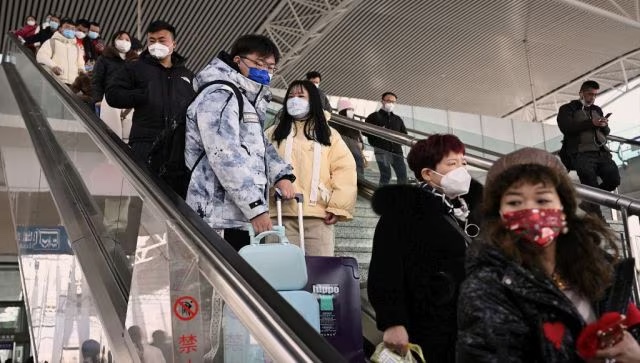
South Korea was the first to announce the new policy, which included requirements for testing and restrictions on visas for Chinese tourists.
China’s embassies in Seoul and Tokyo reported that on Tuesday, it stopped issuing short-term visas to South Koreans and Japanese in apparent retaliation for restrictions placed on Chinese travelers due to concerns about Covid.
South Korea was the first to announce the new policy, which included requirements for testing and restrictions on visas for Chinese tourists.
Due to concerns about an increase in Covid-19 infections in China, it joined more than a dozen other nations in imposing new travel restrictions.
The Beijing embassy in Seoul stated, “Chinese embassies and consulates in Korea will suspend the issuance of short-term visas for Korean citizens.”
It stated that the measures would be “adjusted again in line with South Korea’s removal of China’s discriminatory entry restrictions”
China currently does not issue tourist visas and requires all arrivals to pass a negative Covid test.
In a brief statement late on Tuesday, Beijing’s embassy in Tokyo said that visas for Japanese citizens would also be stopped. It didn’t say why or how long the change would last.
Travelers from the mainland, Hong Kong, and Macau must test negative prior to departure, and Seoul is also limiting flights from China.
The measures have been defended by Seoul’s foreign minister as being “in accordance with scientific evidence.”
According to authorities, mainland visitors are also being tested upon arrival and must remain in quarantine for a week if they test positive.
A measure that is currently not required of other travelers, Japan will now require arrivals from mainland China and Macau to undergo testing prior to travel and upon arrival.
Although Hong Kong arrivals are exempt from the new regulations, flights from the mainland can only land at specific airports.
-Manhunt: The case of a Chinese national who tested positive upon arriving in Seoul, refused to be quarantined, and then fled has dominated South Korean media coverage, resulting in a two-day manhunt.
The unidentified Chinese national, a medical tourist, was eventually located by police. According to reports from South Korean media, the visitor will be questioned regarding the offense this week.
Since January 2, official figures indicate that 2,224 Chinese nationals with short-term visas have arrived in South Korea, with 17.5% testing positive upon arrival.
Until the end of January, South Korea will only issue short-term visas to Chinese citizens to public officials, diplomats, and individuals traveling for critical humanitarian or business reasons.
Additionally, all flights from China must now land at the primary Incheon International Airport in South Korea.
Prior to the pandemic, the southernmost island in South Korea, Jeju, which has its own international airport and separate visa entry requirements, was a popular tourist destination for Chinese arrivals.
When Seoul announced the measures last month, Prime Minister Han Duck-soo stated, “inevitably strengthening some anti-epidemic measures to prevent the spread of the virus in our country due to the worsening Covid-19 situation in China.”
Scientific measures Seoul “communicated with China in advance” about the measures, according to a statement from the South Korean foreign ministry, and the information was “shared transparently with the international community.”
The fact that “a few countries still insist on discriminatory entry restrictions against China” was described as “regrettable” by the foreign ministry in Beijing.
Wang Wenbin, the ministry’s spokesman, said that China was “firmly opposed” to the restrictions. He didn’t say anything about China’s decision to stop issuing visas to South Koreans.
In an effort to discourage what he referred to as “political maneuvering and… discriminatory practices,” Wang stated, “We once again call on relevant countries to take scientific and appropriate measures based on facts.”
After Beijing began to relax the stringent controls that had sunk the economy and sparked protests across the country, China’s hospitals have seen an unprecedented increase in the number of patients admitted there.
According to official data from Seoul, Chinese tourists accounted for 34.4 percent and 27.2 percent of all foreign tourists visiting South Korea in 2019 and 2020, respectively.
However, South Korea’s culture ministry informed AFP that the number of Chinese tourists decreased significantly from 6.02 million in 2019 to 200,000 from January to November 2022, making up only 7.5% of all international tourists.
A third of all visitors came from China as well.